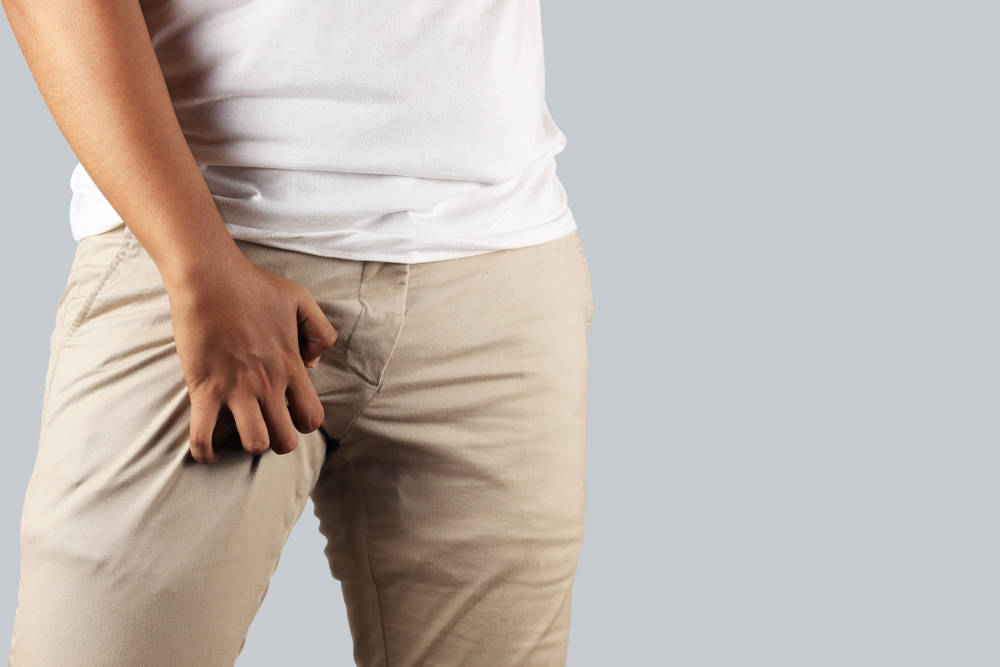Having a moist area in your inner thighs with skin irritation can be a cause of concern. If you are experiencing painful itching with red blotchy spots, especially in your groin area, then you must have a jock itch.
Jock itch is a common fungal infection that affects many individuals, particularly athletes or those who engage in activities that lead to sweating and friction in the groin area.
It can cause discomfort, itchiness, and even embarrassment. In this blog post, we will delve into the causes, symptoms, prevention measures, and treatment options for jock itch, equipping you with the knowledge to combat this pesky condition effectively.
Note: It is important to consult a healthcare professional or dermatologist for an accurate diagnosis and personalized treatment plan for jock itch.
Table of Contents
Understanding Jock Itch
Jock itch, scientifically known as Tinea cruris, is a fungal infection caused by the growth of dermatophytes, a type of fungus. This fungus thrives in warm and moist areas, such as the groin, inner thighs, and buttocks. It is highly contagious and can spread through direct contact or by sharing contaminated items like towels or clothing.
In women, a jock itch is triggered by having consistent rashes in your inner thighs usually after periods.
In men, however, yeast infection or urine leakage can be a major contributor of jock itch.
Signs and Symptoms
The primary symptoms of jock itch include intense itching, redness, and irritation in the groin area. The affected skin may become scaly and develop a rash with well-defined borders. In some cases, blisters or ulcers may form, causing additional discomfort. If left untreated, the infection can worsen and spread to other parts of the body.
Lifestyle Tips for Jock Itch Management
- Keep the Affected Area Clean and Dry – Gently wash the area daily with mild soap and water, ensuring thorough drying afterward.
- Avoid Irritants – Steer clear of harsh soaps, scented products, and tight-fitting clothing that can further irritate the skin.
- Practice Good Hygiene in Public Areas – Use a towel as a barrier when sitting in public saunas, locker rooms, or gym equipment to reduce the risk of infection transmission.
- Be Cautious with Laundry – Wash clothes, towels, and bedding in hot water to kill any lingering fungi. Avoid sharing personal items like towels or underwear.
- Wear Loose-Fitting Clothing – Opt for loose-fitting, breathable underwear and clothing to minimize friction and allow air circulation, reducing the likelihood of excessive sweating.
- Change Wet or Sweaty Clothing – If you engage in activities that cause excessive sweating, change out of wet or sweaty clothes as soon as possible. Moisture promotes the growth of fungi, making the area more susceptible to infection.
- Use Antifungal Powders or Sprays -Consider using antifungal powders or sprays in the groin area, particularly before engaging in activities that induce sweating. These products help keep the area dry and create an inhospitable environment for fungal growth.
Risk Factors
People who sweat excessively, such as athletes or individuals with hyperhidrosis, are more prone to developing jock itch.
- Those who wear tight-fitting clothing or non-breathable fabrics, which trap moisture, are at a higher risk.
- Individuals with a weakened immune system, diabetes, or obesity may be more susceptible to fungal infections, including jock itch.
Complications
If jock itch is left untreated or inadequately treated, it can lead to complications such as cellulitis, a bacterial infection of the skin, or a secondary fungal infection.
Scratching the affected area excessively can break the skin, making it more susceptible to fungal acne and bacterial infections.
Recommended Read – How to Treat and Identify Fungal Acne
In rare cases, the infection may spread to the nails, leading to a condition called onychomycosis.
Treatment Options
Over-the-Counter (OTC) Antifungal Creams
According to top urologist of Lahore, Dr. Zubair Ahmad Cheema, OTC creams, such as those containing clotrimazole or miconazole, can effectively treat jock itch. Follow the instructions on the packaging and apply the cream to the affected area as directed.
Recommended Read – Best Antifungal Creams in Pakistan
Prescription Medications
In severe or persistent cases, a healthcare professional may prescribe stronger antifungal medications, such as oral pills or topical creams. It is crucial to complete the entire course of treatment, even if the symptoms subside before completion.
Home Remedies
Some individuals find relief by using natural remedies like tea tree oil, apple cider vinegar, or a mixture of garlic and honey. While these remedies may provide temporary relief, it is advisable to consult a healthcare professional for a comprehensive treatment plan.
When to Seek Medical Attention
Most cases of jock itch can be effectively treated at home. However, it is advisable to consult a healthcare professional if:
- The symptoms persist or worsen despite self-care measures.
- The rash spreads to other parts of the body.
- The affected area becomes warm, tender, or shows signs of pus, indicating a possible secondary bacterial infection.
Jock itch, though inconvenient, can be managed and treated effectively with the right approach. By understanding the causes, recognizing the symptoms, practicing good hygiene, and seeking appropriate treatment when necessary, you can overcome jock itch and prevent its recurrence.
If you do experience jock itch, promptly seeking appropriate treatment, whether over-the-counter or through a healthcare professional, can help alleviate the symptoms and accelerate healing.
It is Important to note that maintaining a healthy and clean groin area, along with prompt action, are the keys to banishing jock itch and enjoying optimal comfort and well-being.
